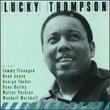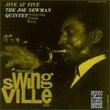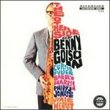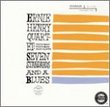| All Artists: Ernie Henry Title: Last Chorus Members Wishing: 1 Total Copies: 0 Label: Ojc Release Date: 5/6/1998 Genres: Jazz, Pop Style: Bebop Number of Discs: 1 SwapaCD Credits: 1 UPC: 025218190626 |
Search - Ernie Henry :: Last Chorus
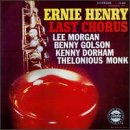 | Ernie Henry Last Chorus Genres: Jazz, Pop
|
Larger Image |
CD DetailsSimilar CDs
|
CD ReviewsUnknown legend Kevin W. Celebi | 03/22/2001 (3 out of 5 stars) "Do wheels of fortune spin? Can the arrow land in shadow and light? Who-knows?...just Ernie Henry left a pearl in his short wake. This is the best collection including sets played with Lee Morgan, Melba Liston, Benny Golson, Cecil Payne, Wynton Kelly, Paul Chambers, Philly Joe Jones, Kenny Dorham, Eddie Mathias, G.T. Hogan, Monk (excerpt from Ba-Lue Bolivar Ba-Lues-Are via Brilliant Corners-Monk had Henry tracked down for the record), Kenny Drew, Wilbur Ware, Art Taylor and ofcourse the other musicians on B.Corners. Ernie Henry had his own sound but few chances. Sad he passed, glad he played. Beautiful music. ps...the records over 45 mins long." A man of great curiosity Kevin W. Celebi | Greencastle, IN | 03/16/2008 (5 out of 5 stars) "This extremely rare compilation couples a few sessions showcasing the underground talent of Ernie Henry. Henry is a cult figure among jazz fans (think of Tina Brooks, Herbie Nichols, Elmo Hope, etc.) whose playing was so effortless that it evoked the feeling of magic. The sessions are: a four-track session under the name of "Ernie Henry Octet," a track from the "Kenny Dorham Quartet," a track from the "Thelonious Monk group," a track from the "Ernie Henry Quartet," and finally a track from the "Ernie Henry Quintet." As you can see, the re-issuing of such piecemeal material under a single album will be very appealing to Henry fans.
The music of "Last Chorus" is atypical of most of jazz from 1956-1957: plenty of standards, boppish originals, highly arranged melodies (in the octet's case), and the same several musicians from Dizzy Gillespie's big band hanging out (Wynton Kelly, Henry, Benny Golson, Paul Chambers, Lee Morgan, etc). As for Henry's playing himself, his flat intonation will surely put off several listeners, but his harmonic explorations went much further than most altoists of the day, combining Bird's lines with a heightened sense of the blues. The album receives a huge uplift from the playing of 18 year old Lee Morgan. Morgan was at his early best: a devoted worshipper of Clifford Brown, yet making up for the difference in virtuosity with sassiness and humor. On "All the Things You Are," he takes the bridge with alternate fingered notes, giving the feel and sound of a trumpet gurgling underwater (having trouble picturing that? Listen to the song!). His solo on "Autumn Leaves" sees him riding a boat of assured confidence through the song's otherwise ho-hum chord changes: those immortal triplet runs, half-valve effects, and the absolutely shimmering vibrato. Now, this CD is probably out of print for a reason - the artist isn't famous and the music isn't groundbreaking. Hence the tragedy of beautiful album's such as "Last Chorus" - jazz albums are unpopular enough as they are, but when it comes to figures passed by in the rearview window, recordings are near impossible to locate. Henry's playing is daring and talented enough to warrant the difficulty of finding the album. Speaking of all the members of Dizzy's band hanging out, there are other albums in this mold to check out - Lee Morgan's recently released "Dizzy Atmosphere" and "Double or Nothin,'" not to mention Dizzy's "At Newport" and "Birks' Works: The Big Band Sessions." Henry is featured on all of these, thus diminishing his legacy's shadows just a shade. The album's most striking and inventive piece was written by the revered and original trombonist, Melba's Liston, and what a clever title - Melba's Tune! It's a ballad to showcase Henry's tone, allowing him to float among the twilit isles of the ensemble and climb a tower of pearls, pale with his inflective but robust vibrato. It's the shortest tune on the album, yet the brightest and filled with the utmost beauty. Alas, Henry passed away just weeks after all of these sessions were recorded. Nobody knows how he died, but it is generally agreed that he was a jazz traveler - from musical realm to musical realm, never resting on his success and always pushing himself to play better, arrange more, and express his ideas even more deeply. " |

 Track Listings (8) - Disc #1
Track Listings (8) - Disc #1